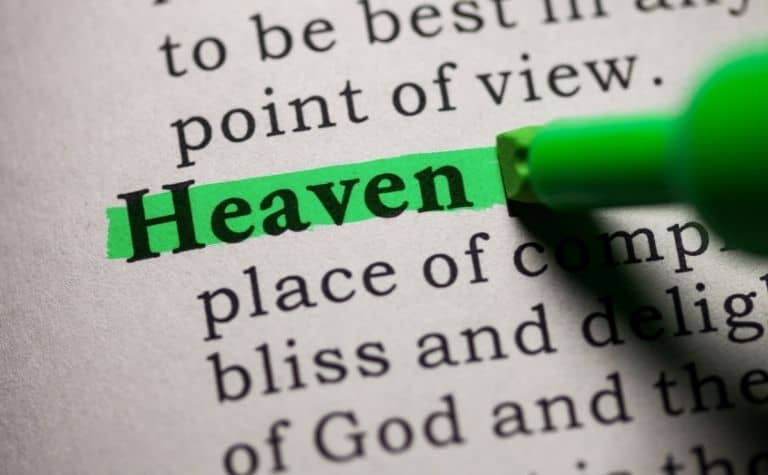The Bible teaches believers to anticipate heaven with hope and joy. People will live forever with God and other believers because of the redemption that Jesus Christ earned for them through his death and resurrection.
But what exactly happens when a believer dies? Do they immediately go into God’s presence and into heaven, or do they have to wait somewhere for a period of time?
According to the Bible, believers immediately enter God’s presence after dying. Deceased believers will be in the presence of Jesus Christ in the blink of an eye. Then, they will wait for the final resurrection when they get new bodies and live on the New Heavens and New Earth.
Is there a period of conscious or unconscious waiting before a believer goes to heaven? What’s the difference between the intermediate state and purgatory?
Keep reading to learn the answers to these questions and more as we explore what the Bible says about how soon after death a believer goes to heaven.
Also, see Will People Remember Their Family In Heaven? to learn more.

What Happens After Death?
The Bible teaches that believers are immediately in the presence of God in what theologians call the intermediate state when they die. The verses below indicate that being with Christ is immediate.
| Luke 23:34 | And [Jesus] said to [the thief], “Truly, I say to you, today you will be with me in paradise.” (ESV) |
| Phil. 1:23 | “For I am hard-pressed between the two, having a desire to depart and be with Christ, which is far better.” (NKJV) |
| 2 Cor. 5:8 | “Yes, we are fully confident, and we would rather be away from these earthly bodies, for then we will be at home with the Lord.” (NLT) |
The intermediate state in Christian theology refers to the period immediately after a person’s physical death. During this time, the soul exists apart from the body, awaiting the resurrection and final judgment.
What’s the difference between the intermediate state and heaven?
| Intermediate State | Heaven | |
|---|---|---|
| Definition | The temporary state of the soul between death and the final resurrection. | The eternal dwelling place of the righteous with God. |
| Duration | Temporary, lasting until the final resurrection and judgment. | Eternal, beginning after the final judgment. |
| Nature of Existence | The soul exists apart from the body, awaiting the resurrection. | The soul is reunited with a glorified body in the presence of God. |
| Biblical Support | Verses such as Luke 16:19-31 and 2 Corinthians 5:6-8 suggest a conscious existence after death but before the final resurrection. | Verses such as Revelation 21:1-4 describe the eternal state of the righteous in the presence of God. |
Is the intermediate state a place of punishment? No. There is no additional pain and suffering that a believer must undergo to expel their wickedness because Christ died for all their sin, not just some of them. Compare the intermediate state and the Catholic doctrine of purgatory below.
Also, see Is There Sex In Heaven? to learn more.

Biblical References to Death and the Afterlife
Four topics that the Bible highlights about what happens after death include the resurrection of believers, the new bodies they will receive, the arrival of the New Heavens and New Earth, and the Second Coming.
Learning about these topics helps us understand how soon after death someone goes to heaven.
The role of Jesus Christ in the resurrection
The Bible teaches that Jesus’ resurrection is the foundation for the resurrection of His followers.
In 1 Corinthians 15:20-23, Paul describes Jesus as the “firstfruits” of those who have died, indicating that His resurrection is a precursor to the resurrection of believers.
Jesus’ victory over death gives hope to His followers that they, too, will be raised to eternal life.
In John 11:25, Jesus declares, “I am the resurrection and the life. The one who believes in me will live, even though they die.” (NIV)
This promise of resurrection and eternal life is central to the Christian faith and offers hope to believers.
The New Heavens and New Earth
The Bible teaches that a New Heaven and New Earth will be established by God, as described in Revelation 21:1-5.
This new creation will be free from sin, death, and suffering and will be the eternal dwelling place of the righteous. It represents the fulfillment of God’s promise of a perfect world.
Glorified Bodies
The Bible teaches that believers will receive a new, glorified body after death, as described in 1 Corinthians 15:42-44. This resurrected body will be imperishable, immortal, and free from the limitations of the earthly body. It reflects the transformation and renewal that comes with eternal life in Christ.
The Second Coming of Christ
The Bible teaches that Jesus will return to earth in glory, as described in Matthew 24:30-31. His second coming will be marked by the resurrection of the dead, the final judgment, and the establishment of God’s eternal kingdom.
Also, see Do People Who Commit Suicide Go To Heaven? to learn more.
4 Common Misconceptions About Heaven and Afterlife
Sometimes people confuse what the Bible says about heaven and the afterlife with what other worldviews and religions teach about them. Here are some common misconceptions.
Heaven is a Physical Place in the Sky
Some people imagine heaven as a physical location in the sky, often depicted as a place with pearly gates and streets of gold. In reality, the Bible describes heaven as a spiritual realm where God dwells, beyond our physical universe.
Everyone Goes to Heaven
Another misconception is that all people, regardless of their beliefs or actions, will go to heaven. However, according to the Bible, entrance into heaven is based on faith in Jesus Christ and the acceptance of His gift of salvation.
Heaven is Boring
Some people envision heaven as an endless, monotonous worship service. In contrast, the Bible portrays heaven as a place of joy, fulfillment, and perfect communion with God, where believers will experience the fullness of His presence and love.
Reincarnation
Some believe in reincarnation, the idea that after death, the soul is reborn into a new body. This concept is not supported by the Bible, which teaches that after death, the soul awaits resurrection and final judgment, followed by eternal life in heaven or separation from God.
The Comfort and Hope in the Resurrection
The Bible teaches that the resurrection of Jesus Christ is the foundation of the Christian faith and the source of hope and comfort for believers.
This promise of resurrection and eternal life with God offers hope to those facing death and comfort to those who have lost loved ones.
In John 11:25-26, Jesus declares, “I am the resurrection and the life. The one who believes in me will live, even though they die.” (NIV)
This assurance of resurrection and eternal life is central to the Christian faith and provides comfort and hope in times of grief and loss.
Also, see Did Moses Go To Heaven? to learn more.
How Do the Resurrection and Purgatory Compare?
Purgatory isn’t a physical location, but a condition or state of being, according to Pope John Paul II (1920-2005). In purgatory, people are punished for their sins. When their punishment is deemed to be sufficient in relation to their unrighteousness, they enter heaven.
| Aspect | Intermediate State | Purgatory |
|---|---|---|
| Definition | The temporary state of the soul between death and the final resurrection. | A temporary state of purification for souls who have died in a state of grace but still need to be purified before entering heaven. |
| Duration | Temporary, lasting until the final resurrection and judgment. | Temporary, lasting until the soul is purified and ready to enter heaven. |
| Nature of Existence | The soul exists apart from the body, awaiting the resurrection. | The soul undergoes purification to atone for venial sins and the temporal punishment due to sin. |
| Biblical Support | Verses such as Luke 16:19-31 and 2 Corinthians 5:6-8 suggest a conscious existence after death but before the final resurrection. | The concept of purgatory is primarily supported by Catholic tradition and interpretations of verses such as 1 Corinthians 3:15 and 2 Maccabees 12:42-46. |
| Theological Views | Various views exist, including soul sleep, conscious existence, and purgatory (in Catholic theology). | Purgatory is a doctrine of the Roman Catholic Church and is not widely accepted by Protestant denominations. |
| Experience of Time | May be experienced differently, as it is a spiritual state outside of the physical world. | The experience of time in purgatory may differ from earthly time, and the duration of purification varies for each soul. |
| Conditions | Varies depending on theological views; may involve a state of rest, waiting, or purification. | Involves a process of purification through suffering, which can be alleviated by the prayers and intercessions of the living. |
Also, see Does Everyone Go To Heaven? to learn more.
References:
[1] Roman Catholic – Purgatory
[2] Britannica – Purgatory
[3] Bible Hub
[4] Intermediate State
Related Articles
There is a lot of wishful thinking about what heaven will be like. Many people conjure up in their imaginations a self-centered utopia that satisfies their every urge and whim. Yet heaven isn't...
God created sex. He was the matchmaker for the first couple, Adam and Eve, and designed the pair to "become one flesh" (Gen. 2:24). In the rest of the Bible, sex is celebrated in proper...
